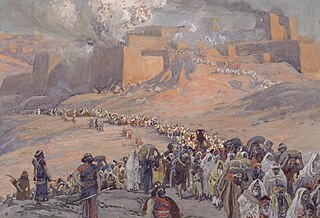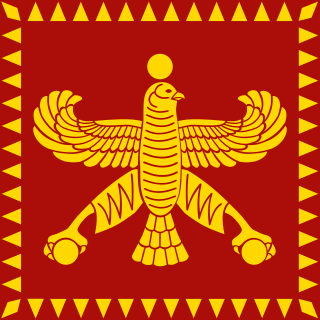
The Babylonian captivity or Babylonian exile is the period in Jewish history during which a large number of Judeans from the ancient Kingdom of Judah were captives in Babylon, the capital city of the Neo-Babylonian Empire, following their defeat in the Jewish–Babylonian War and the destruction of Solomon's Temple in Jerusalem. The event is known to be historical, and is described in archaeological and extra-biblical sources, in addition to the Hebrew Bible.
This is a list of notable events in the development of Jewish history. All dates are given according to the Common Era, not the Hebrew calendar.

Jewish history is the history of the Jews, and their nation, religion, and culture, as it developed and interacted with other peoples, religions, and cultures.

The Jewish diaspora or exile is the biblical dispersion of Israelites or Jews out of their ancient ancestral homeland and their subsequent settlement in other parts of the globe.
Tannaim were the rabbinic sages whose views are recorded in the Mishnah, from approximately 10–220 CE. The period of the Tannaim, also referred to as the Mishnaic period, lasted about 210 years. It came after the period of the Zugot "Pairs" and was immediately followed by the period of the Amoraim "Interpreters".

Cochin Jews are the oldest group of Jews in India, with roots that are claimed to date back to the time of King Solomon. The Cochin Jews settled in the Kingdom of Cochin in South India, now part of the state of Kerala. As early as the 12th century, mention is made of the Jews in southern India by Benjamin of Tudela. They are known to have developed Judeo-Malayalam, a dialect of Malayalam language.

Jewish languages are the various languages and dialects that developed in Jewish communities in the diaspora. The original Jewish language is Hebrew, supplanted as the primary vernacular by Aramaic following the Babylonian exile. Jewish languages feature a syncretism of Hebrew and Judeo-Aramaic with the languages of the local non-Jewish population.

Judeo-Arabic dialects are ethnolects formerly spoken by Jews throughout the Arabic-speaking world. Under the ISO 639 international standard for language codes, Judeo-Arabic is classified as a macrolanguage under the code jrb, encompassing four languages: Judeo-Moroccan Arabic (aju), Judeo-Yemeni Arabic (jye), Judeo-Iraqi Arabic (yhd), and Judeo-Tripolitanian Arabic (yud).
Mizrahi Jews, also known as Mizrahim (מִזְרָחִים) or Mizrachi (מִזְרָחִי) and alternatively referred to as Oriental Jews or Edot HaMizrach, are a grouping of Jewish communities comprising those who remained in the Land of Israel and those who existed in diaspora throughout and around the Middle East and North Africa (MENA) from biblical times into the modern era.

The Jewish Neo-Aramaic dialect of Urmia, a dialect of Northeastern Neo-Aramaic, was originally spoken by Jews in Urmia and surrounding areas of Iranian Azerbaijan from Salmas to Solduz and into what is now Yüksekova, Hakkâri and Başkale, Van Province in eastern Turkey. Most speakers now live in Israel.
Barzani Jewish Neo-Aramaic is a modern Jewish Aramaic language, often called Neo-Aramaic or Judeo-Aramaic. It was originally spoken in three villages near Aqrah in Iraqi Kurdistan. The native name of the language is Lishanid Janan, which means 'our language', and is similar to names used by other Jewish Neo-Aramaic dialects .

Judaeo-Aramaic languages represent a group of Hebrew-influenced Aramaic and Neo-Aramaic languages.
The history of the Jews and Judaism in the Land of Israel begins in the 2nd millennium BCE, when Israelites emerged as an outgrowth of southern Canaanites, During biblical times, a postulated United Kingdom of Israel existed but then split into two Israelite kingdoms occupying the highland zone: the Kingdom of Israel (Samaria) in the north, and the Kingdom of Judah in the south. The Kingdom of Israel was conquered by the Neo-Assyrian Empire, and the Kingdom of Judah by the Neo-Babylonian Empire. Initially exiled to Babylon, upon the defeat of the Neo-Babylonian Empire by the Achaemenid Empire under Cyrus the Great, many of the Jewish exiles returned to Jerusalem, building the Second Temple.

The Second Temple period or post-exilic period in Jewish history denotes the approximately 600 years during which the Second Temple stood in the city of Jerusalem. It began with the return to Zion and subsequent reconstruction of the Temple in Jerusalem, and ended with the First Jewish–Roman War and the Roman siege of Jerusalem.

Judea or Judaea is a mountainous region of the Levant. Traditionally dominated by the city of Jerusalem, it is now part of Palestine and Israel. The name's usage is historic, having been used in antiquity and still into the present day; it originates from Yehudah, a Hebrew name. Yehudah was a son of Jacob, who was later given the name "Israel" and whose sons collectively headed the Twelve Tribes of Israel. Yehudah's progeny among the Israelites formed the Tribe of Judah, with whom the Kingdom of Judah is associated. Related nomenclature continued to be used under the rule of the Babylonians, the Persians, the Greeks, and the Romans. Under the Hasmoneans, the Herodians, and the Romans, the term was applied to an area larger than the historical region of Judea. In 132 CE, the Roman province of Judaea was merged with Galilee to form the enlarged province of Syria Palaestina.

Yehud, also known as Yehud Medinata or Yehud Medinta, was an autonomous administrative province of the Achaemenid Persian Empire. It was one of several such provinces in Palestine, with the others being Moab, Ammon, Gilead, Samaria, Ashdod and Idumea, constituting the fifth Persian satrapy of Eber-Nari. Located in Judea, it continued to exist for two centuries before it was incorporated into the Hellenistic empires following the Wars of Alexander the Great.
Martyrdom in Judaism is one of the main examples of Jews doing a kiddush Hashem, a Hebrew term which means "sanctification of [the] name". An example of this is public self-sacrifice in accordance with Jewish practice and identity, with the possibility of being killed for no other reason than being Jewish. There are specific conditions in Jewish law that deal with the details of self-sacrifice, be it willing or unwilling.

Jews or Jewish people are an ethnoreligious group and nation originating from the Hebrews or Israelites of the ancient Near East, and whose traditional religion is Judaism. Jewish ethnicity, religion, and community are highly interrelated, as Judaism is an ethnic religion, although not all ethnic Jews practice it. Despite this, religious Jews regard individuals who have formally converted to Judaism as part of the community.
The following outline is provided as an overview of and topical guide to Judaism:
 Definitions from Wiktionary
Definitions from Wiktionary Media from Commons
Media from Commons News from Wikinews
News from Wikinews Quotations from Wikiquote
Quotations from Wikiquote Texts from Wikisource
Texts from Wikisource Textbooks from Wikibooks
Textbooks from Wikibooks Resources from Wikiversity
Resources from Wikiversity










